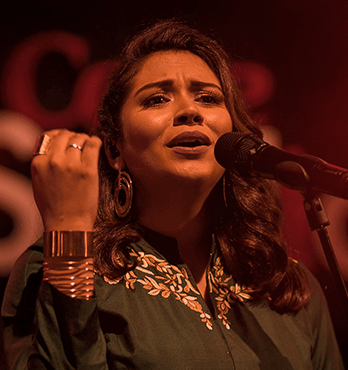Nimra Rafiq

by Aliya Farrukh Shaikh
Nimra Rafiq has an unguarded presence, carrying a burst of energy with her into every room she enters. A member of the Coke Studio family, she quickly makes herself at home in the studio space. During morning riyaaz, Nimra’s soprano voice can be heard echoing outside the backing vocalist’s room. She befriends her fellow house band members easily, and her laughter is often heard coming from the garden, where the musicians lounge in the shade at lunch. Nimra also carves a space for her talent, winning the regard of her colleagues because of her vocal range — the high notes she can hit and sustain, which give her voice a sweet, delicate texture.
Nimra’s comfortable and confident presence were not an overnight occurrence — if anything, it was a difficult journey that posed its challenges. Nimra came into singing in 2008, when she was fifteen years old, at the encouragement of her English teacher. Nimra had participated in school choirs and her teacher saw talent in her that she herself did not see at the time. While she was not inclined towards pursuing music at the time, urged on by her teacher and school friends, Nimra became the contest’s youngest participant.
Nimra remembers the fearless confidence she felt then, “I wasn’t scared of anyone during the show. Maybe because I was a child and I didn't think too much about getting eliminated. I think if I took part in it now, I would’ve been more determined and careful.” She took the task seriously and remembers sitting down with a song and analysing it – really hearing its lyrics, melody, and rhythm – for the first time in her life when preparing for the audition. The song was Mere Dholna, sung by Shreya Ghosal for the Bollywood film Bhool Bhulaiya. Nimra, who didn’t have access to internet or a cell phone at the time, bought the film’s DVD. Her family’s DVD player was broken, and she couldn’t rewind the song, forcing her to play it over and over again so she could write the sargam in parts. Perhaps, this is what Nimra means when says her greatest musical learning has been from listening to music closely, “I’ve taught myself by listening,” she says. “Maine apne aap ko sun ke sikhaya hai”, she says.
Nimra made it to the twelfth round of the reality show and, when she was voted off, the experience sparked a determination inside her. “If I really am as talented as others believe, why did I get eliminated? How did I not win?” Nimra began to take music seriously, teaching herself the technicalities of singing by listening and observing.
In a quest to turn her dream into a reality, Nimra started attending morning shows as part of paid audiences, promised by line producers that she may get the chance to be called on stage to sing. She would sit in the audience, clapping enthusiastically, hoping that she would one day be asked to come on stage and sing. However, she’d be left with no such experience; her coordinator would rob her off her payment for the show, and she would be stuck commuting to and from the studio on public buses and rickshaws on the little money that she had saved from odd jobs. Many days, she would be asked to join a paid audience and would reach the venue on a moment’s notice, without bothering to inquire about the pay. “Every time, I would go with the hope that I would get a chance to sing in front of everyone.”
With a lack exposure, and no contacts within the industry, Nimra also found herself being judged on the basis of her socioeconomic status, the clothes she wore, and the way she looked. She recounts instances when shows would be refused to her because of the plainness of her attire, and the biased associations people made with the middle-class neighborhood she belonged to. “I was considered to be uneducated and ill-groomed. The coordinators of the shows would insult me in front of other people, but I still didn’t lose hope, because I knew that talent has no social status.”
During this period, she was continuously giving auditions, performing at small events, seeking out contacts. There was a well-known reality show that would recruit aspiring singers every year and Nimra auditioned every time without fail. When she was rejected for the fourth time in a row, she packed her dreams into a little box and discarded them at the back of her mind. “I was very disheartened, very disappointed and very lonely,'' she says. Her father, her only listener and trusted confidante, was working abroad, and she would find herself struggling to confide with anyone at home. Nimra had left her education to follow her voice; while she always knew her greatest education was her musical learning, she found herself withdrawing into a cloud of self-doubt and helplessness during that difficult period.
Even at this dispiriting time, Nimra kept hustling, performing wherever she got the opportunity and, in 2014, was noticed by Ahsan Bari, found of Sounds of Kolachi, during a performance at the Arts Council of Pakistan. Nimra went on to join the ensemble as a backing vocalist, traveling through the United States in a Center Stage tour with the group in 2017. She has lent her vocals to multiple drama OSTs and joined the Coke Studio family in Season 9, returning this season after two years away from the studio.
Now when she looks back at her experiences, Nimra feels proud to have worked through all that she did. An open book, Nimra openly talks about the rejection she faced, not shying away from speaking about the unpleasant truths that have been a part of her journey. The fearlessness with which she entered that first ever reality show is still left in her which is shown in the way she carries herself. She doesn’t mince her words, is unapologetically herself and never shies away from the musical challenges that come her way. The openness of her voice is reflected in the texture of her voice, her high trill and the sweetness that lines the notes she sings.
